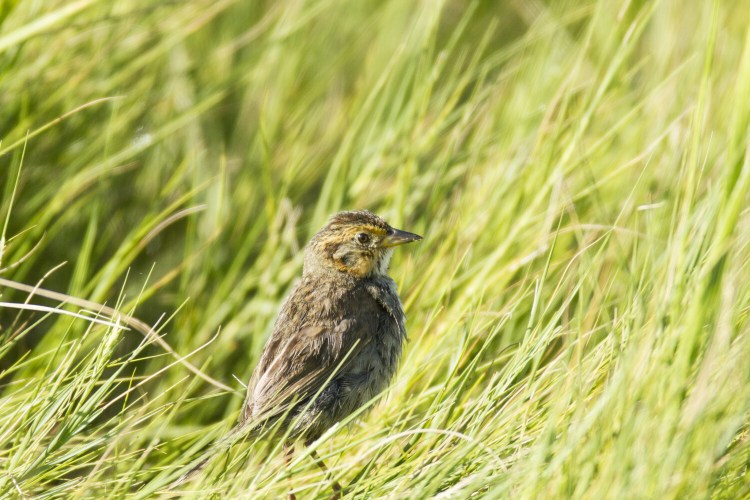Nature is fascinating because it defies generalization. A biologist has to use the word “all” carefully. The statement that all mammals have hair is belied by the hairless condition of naked mole rats. The claim that all butterflies and moths (180,000 species) sip nectar or rotting plant material is contradicted by a genus of moths that have gone the way of vampires, piercing and sucking the blood of mammals.
With over 10,000 species, birds provide many examples of generalization-busting examples. In today’s column, I’ll focus on the saltmarsh sparrow. This species is unique in being the only songbird that is restricted to intertidal salt marshes (aka an obligate resident). Its breeding range stretches along the Atlantic Coast from the expansive tidal marshes of the Delmarva Peninsula to Knox County here in Maine. Their breeding range is more like a string of pearls than a continuous band. Suitable nesting marshes are not continuous along the coast.
These sparrows are migratory over most of their range, wintering in tidal marshes from northern Virginia down to central Florida along the Atlantic Coast, with some wintering on the upper Gulf Coast of Florida.
A good place to see this rather secretive species is to walk the Eastern Trail through Scarborough Marsh. Even by sparrow standards, these sparrows are drab. The birds have a flattish head with an orange stripe above the eye and an orange mustache, known as a malar stripe. The breast is buffy (or light brownish yellow) with streaks.
The species has an interesting taxonomic history. Nelson’s sparrow, a species which nests in Maine from Cumberland County to Washington County, was formerly lumped with saltmarsh sparrow and called sharp-tailed sparrow. Thanks to the work of Jon Greenlaw and others at Scarborough Marsh, we now know that two species were improperly lumped into sharp-tailed sparrow. The Check-list Committee of the American Ornithological Society split sharp-tailed sparrow in 1995.
The reliance on tidal marshes is hardly the only exceptional facet of the biology of saltmarsh sparrow. We think of songbirds as being monogamous birds with both parents sharing parental duties. A male stakes out a territory and defends it against intruding males and predators. Although we know that cheating on one’s mate occurs when the opportunity arises, faithfulness is the rule.
Saltmarsh sparrows are different beasts in these regards. Males do not maintain nesting territories. Rather, each male has a home range within which it lives, but home ranges of males overlap. Aggressive interactions between males are rare, quite a difference from other songbird species. A male wanders through its home range, seeking receptive females to mate with. The male provides absolutely no care to the young that it fathers.
Any female is likely to be found in the home range of many males, so promiscuity is common. A nest with offspring sired by a single father is rare in this species. Although this unusual nesting strategy is well documented, we do not understand why these birds have diverged from the typical territorial nesting of other songbirds.
Saltmarsh sparrows are not faring well. The population has been declining dramatically for the past 15 years, resulting in an 80 percent reduction of the population. Today, the population stands at only 30,000 birds. It is listed as a Species of Special Concern in Maine with similar designations in other states.
Nest failure results from inundation of the marshes during the highest tides of the tidal cycle and from nest predation. To get a second chance, birds will quickly renest if high tides flood their nests. Sea-level rise is a particular concern because it exacerbates the threat of tidal flooding. Without human management intervention, population models suggest the species could be extinct by the middle of this century. Management plans are being developed with the goal of stabilizing the population at 25,000 birds. More information is available at: acjv.org/saltmarsh-sparrow-2/
Herb Wilson teaches ornithology and other biology courses at Colby College. He welcomes reader comments and questions at whwilson@colby.edu.
Send questions/comments to the editors.



Comments are no longer available on this story